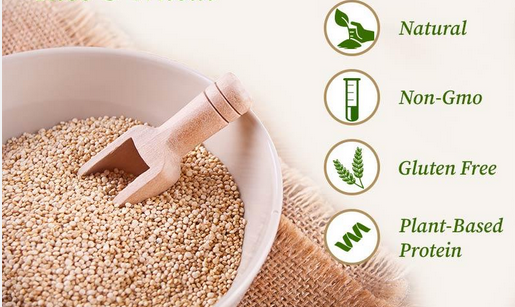We previously discussed organic oats and their benefits. Foods like oats can often be combined with many other nutritious options, such as organic acai or goji berries. Today, let’s delve into the world of organic quinoa, another widely recognized nutritious food. We will explore its history, nutritional profile, and impact on the environment.
The Origins of Quinoa

Quinoa is a historical food originating from the Andean region in South America. It served as a staple for the Inca civilization and has now become widely known for its nutritional content and health benefits. Nearly every health enthusiast has encountered quinoa at least once in their lifetime.
Nutritional Powerhouse

Quinoa is protein-rich and contains all nine essential amino acids, making it an ideal choice for vegans and vegetarians who avoid meat or animal products. Additionally, it is rich in B vitamins and minerals such as iron and magnesium. Notably, quinoa’s gluten-free and low glycemic index profile makes it suitable for weight management.
Organic Quinoa vs. Conventional Quinoa

Choosing organically sourced quinoa provides the advantage of a pesticide and chemical fertilizer-free pure yield, which is much healthier than its conventional counterpart. Moreover, this promotes soil sustainability, as environmental degradation is more pronounced in conventional scenarios. Overall, organically sourced quinoa outshines conventional varieties in every aspect.
Sustainable Quinoa Farming

The good news is that quinoa farming is highly sustainable due to its resilience to high winds, salinity, and droughts. Most quinoa farming is traditionally done, involving minimal artificial chemicals. Organic quinoa cultivation ensures a non-GMO and organic yield, making it an environmentally friendly crop.
Conclusion
Choosing quinoa means embracing a holistic approach to health and contributing to a more environmentally conscious and socially responsible food industry. With numerous benefits and a wallet-friendly price tag, quinoa is a wise and sustainable choice for health-conscious consumers. Keep these considerations in mind as you make informed choices for a healthier and more environmentally friendly lifestyle.
FAQs
- Does organic quinoa have gluten?
No, as we discussed earlier. Organic sourced quinoa doesn’t have gluten in it and is gluten-free.
- Does quinoa need to be organic?
Yes and no. It depends on your needs and goals. You can get away with regular quinoa. But for the most benefits, better to switch to organic one.
- How to cook quinoa?
There are several ways to cook and consume quinoa. We suggest following this guide for more recipes and cooking techniques.
- Where to buy organic quinoa?
As usual, you can find it in your local Walmart or grocery store. However, if you are concerned about adulterations and authenticity then we recommend Kirkland’s signature organic quinoa which is USDA-certified and non-GMO and apt for most people.





